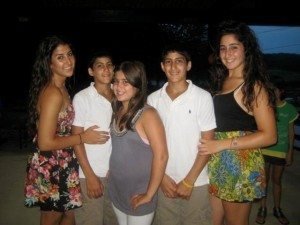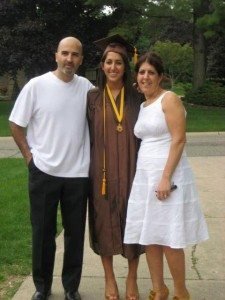FARMINGTON, Mich.—Don’t call Seran Tcholakian a bionic mother, not unless you wish to get a look of consternation.
Ultimate, perhaps. Dedicated, most assuredly. But not bionic.

But how else would you go about describing a woman with five super active kids and a husband who’s been working the past three years as a linguistic/translator for a subcontractor in Iraq? It’s got nothing to do with military, simply job security.
Her life—to put it mildly—is organized chaos but she appears to handle it very well, not exactly by choice, but resignation.
“The reason why it all works is organization,” Seran says. “Everyone has schedules and we keep to them very well. Very little time is wasted.”
A big help is eldest daughter Haigan. A Michigan State University freshman, she manages to juggle her schedule to give mom a helping hand. The 17-year-old played varsity basketball and softball at North Farmington High and belongs to the Hamazkayin Arax Dance Group. Much of her athleticism was portrayed this past AYF Olympics for the Detroit K-T Chapter.
Then there’s 14-year-old Karoun, a North Farmington High freshman. Like her older sister, she competes in basketball, softball, and also dances.
Next come 12-year-old twins Sasoun and Mher. They are Grade 7 students at the Manoogian School and play football for the Farmington Rockets when not throwing a baseball around, shooting hoops, or running track. Both are stellar athletic prospects.
Finally, there is Patil, the youngest at 10 and a fifth-grader at Manoogian School. Not to be denied, she plays basketball and soccer.

All are members of the AYF, Homenetmen, and products of St. Sarkis Sunday School and Camp Haiastan. Haigan was a staffer this past summer. The children serve on the altar, sing in the choir, and serve as Bible readers in church. They play basketball for St. John’s Armenian Church. All read and write Armenian and converse fluently.
The family automobile can substitute for a taxi service with Seran the perpetual chauffeur. Drop one off and pick the other up. Fix dinner. Get the laundry going. Help the children with homework. Straighten out the house. Tend to her own affairs.
Seran is vice-president of the ARS “Maro” Chapter, co-chairs the church bazaar, and helped prepare the Armenian curriculum for the Hye Time program at Camp Haiastan. Her day job as a kindergarten teacher at the Manoogian School is more of a release valve. If she tends to be pushing doors marked “pull,” that’s understandable, considering the rigmarole.
“There are a few people I call when I need rides but try to limit that,” she says. “Usually when I must choose where I have to be, it goes with the youngest—or the football field (in case of injury). The older girls understand that the younger ones are more dependent upon me and are fine with that. But it’s a constant pick-up, drop-off cyclone.”
Don’t get the idea that her children are exempt from chores. While one does the dishes, the other may vacuum. They make their own beds, hang their own clothes, and keep their rooms tidy as best they can. The discipline is textbook standard.
“They’ve been taught that responsibility goes along with fun,” Seran confirmed. “Of all their activities, church and heritage rise above the rest. They’ve participated in genocide demonstrations in New York City and been model AYF members. My husband Rafi and I have always tried teaching our kids that being Armenian is more than just parties, sports, and socializing. It’s all about giving something back and making the Armenian community stronger. It’s about taking responsibility for your actions.”
They met in 1986 when Seran (Kacherian) was visiting friends in Detroit. She was a New York gal, having grown up there and belonged to the New York “Hyortiks” Chapter. Five sessions at Camp Haiastan introduces you to many acquaintances. Rafi grew up in Beirut and came to Detroit in ’86. They wed five years later at St. Vartanantz Church in New Jersey, with 200 guests attending.
For the past 19 years, Michigan has been their home. In 2008, Rafi took the job in Iraq and has been there ever since, except for periodical visits.
“The values we instill in our children are a clear reflection of how we were both raised and a testament to our own parents,” she emphasizes. “Even though I grew up in America and Rafi in Beirut, we were both raised with the same Armenian values. Those values go a long way toward raising our own family in America.”
In 2006, disaster struck. Seran happened to be attending a carnival at St. John’s Armenian Church when a car drove through the crowd and struck her. Both ankles were severely broken. She had surgery that night and spent the next 10 weeks in a wheelchair.
“I think that situation helped make us the couple we’ve now become,” she brought out. “At the time, our children were very young and we needed to work together. My parents came to town the next day and my sister took the younger kids back to New Jersey once school ended. The entire community stepped up to help us. That was really a life-changing experience.”
The fact her husband’s been away for three years holds no animosity with Seran. If anything, she’s grateful he has a job. The communication with family remains active on all fronts, thanks to the electronic age. But distance only makes the heart grow fonder.
“There’s no complaining in our home,” Seran maintains. “We keep our sanity because we believe the alternative could be a lot worse. If we stay positive, so do the children—and that maintains our composure. A strong network of family and friends surely helps.”
Rafi returns home every six months and usually stays for three weeks. Then back he goes to Iraq, emotional as it can get sometimes. He was here for his daughter’s high school graduation and for Christmas each year. What he does miss are his children’s activities.
“I always tell people he’ll be in Iraq for as long as there’s work there and no work here,” Seran pointed out. “We’d love for him to come home, but with the economic state the way it is in Michigan, jobs are scarce. He’s there out of necessity.”
Rafi was in manufacturing and lost his job twice. The situation grew dire over the years. With five kids to support and no income rolling it, he had to bite the bullet. Changes had to be made. The fact Iraq came to him at a time when war was rampant bore no consequence. Today, the risk is less contentious—but it’s still a risk.
“My husband’s safety is always a concern for us,” said his wife. “The fact he grew up in Beirut during the war made it easier for him to go into a country under siege. He left Beirut in 1986 after 11 years of warfare. Life is tough for him over there but he deals with it. He spends his free time working out and just completed a marathon there.”


Great read! God bless you and your family!
awesome article!!! :)
Great article, the Tcholakian’s embrace what an Armenian American family is about. They thrive in America while at the same time contributing to the Armenian community in the USA and abroad.
This is the true vision of what Armenian American families are about.
Doesn’t forgiveness follow repentance, Deniz?
Great article on Seran! She was my son’s Kindergarten teacher. I still remember her at that graduation ceremony in her red maternity dress, when she was pregnant with her twins.